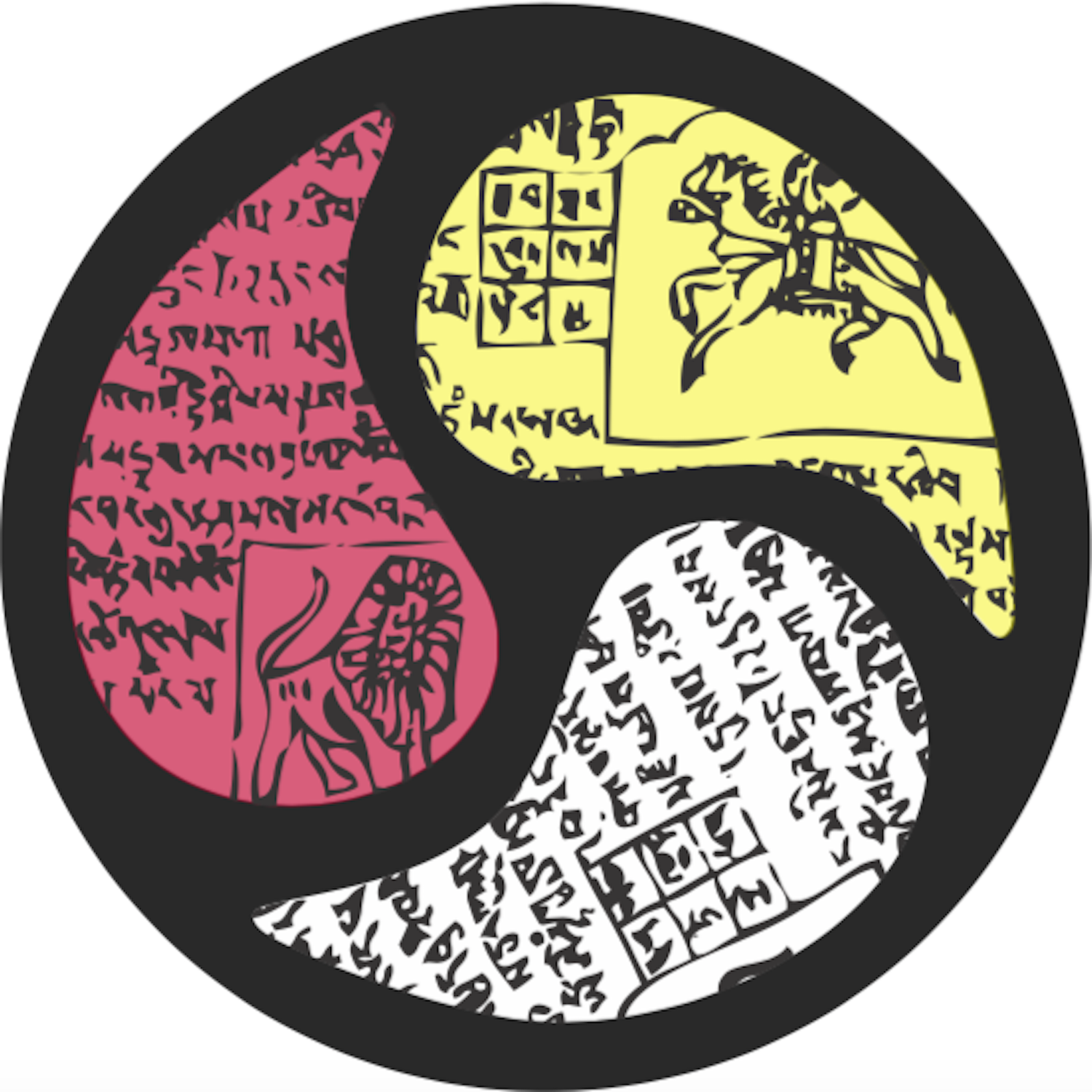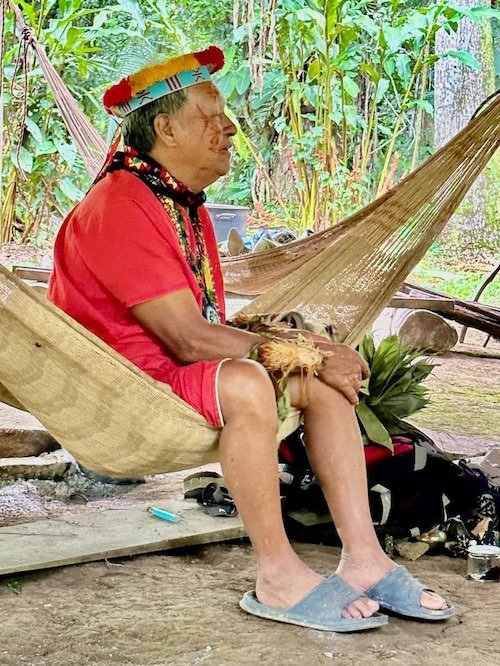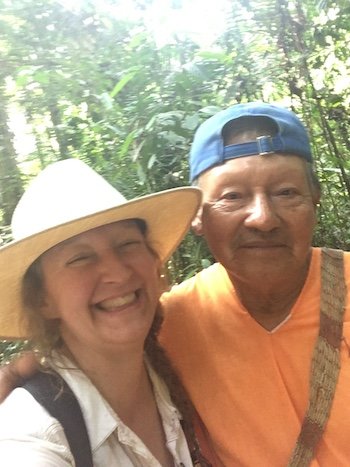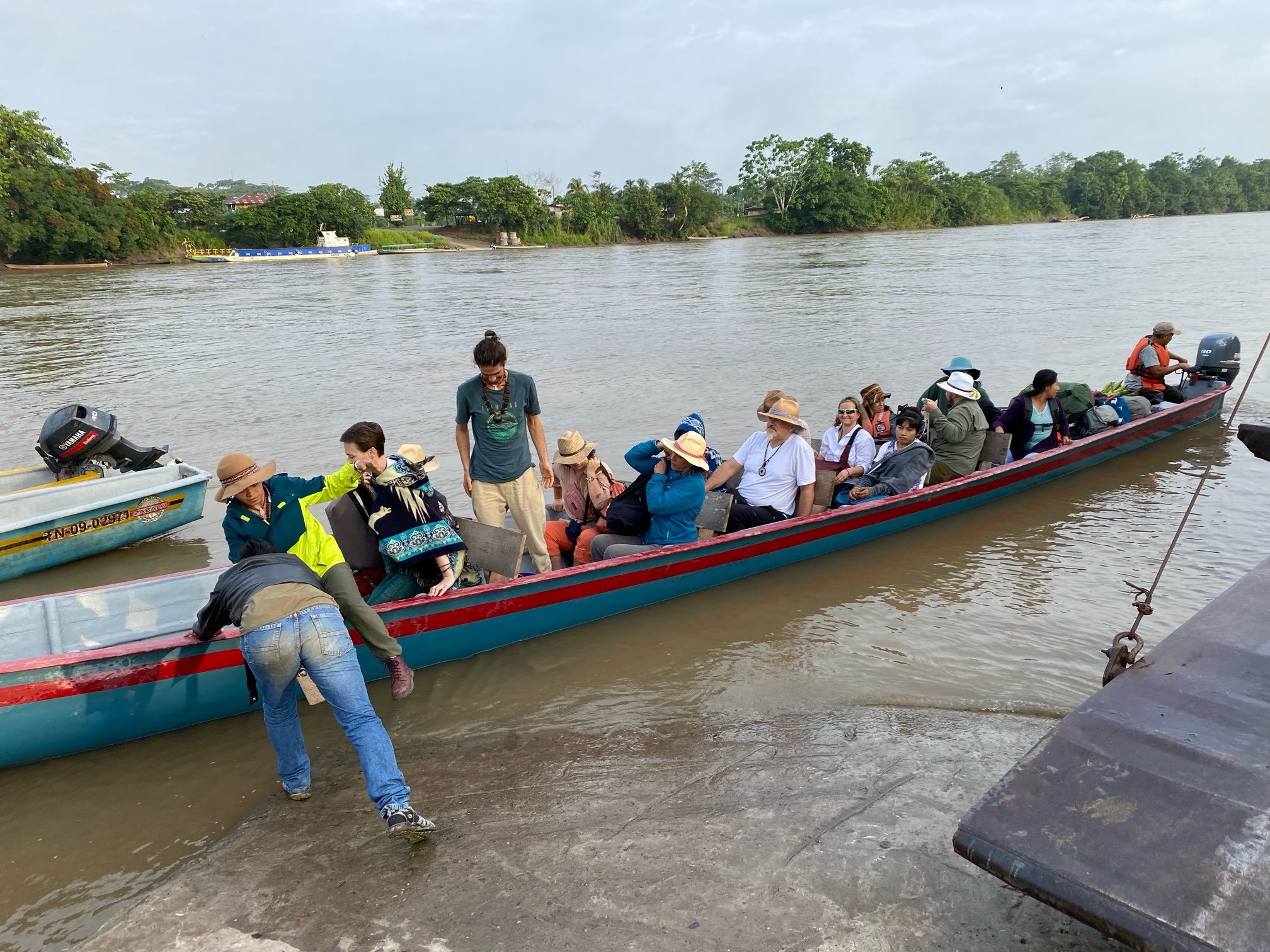Basilio
Basilio in the yaje lodge, morning after ceremony, sitting in one of his beautiful handmade hammocks. Photo credit: Itzhak Beery, 2023
Transcription
Basilio (January 2023)
[Thank you so much to our four translators, Alexandra Kastanopolus, Margot Payaguaje, Josep Rosas, and another Seiko pāai translator!!! It is so much work to translate between the three languages (English, Spanish, and Pāai koka) and their amazing contribution makes sharing this with all of you possible.]
Rattle (Jenny) 0:00
Jenny LePage 0:07
Hi, everyone. This is Jenny LePage, and welcome to the conversation about spiritual awakening, planetary shift in consciousness, adventure, healing, and finding your life path.
Jenny 00:00:25 [In the Amazon introducing Basilio]
We are here in a very special meeting this evening on the Rio Agauarico in the Amazon Basin of Ecuador. And sitting next to me is Don Basilio Payaguaje of the Seiko pāai tribe, and a couple of translators—his daughter, Margot Payaguaje, and Joseph Rosas of Catalan, who has lived with the Seiko pāai tribe here for about 13 years and also speaks the Pāai koka language.
[Also translating is Alexandra Kastanopolous who joined in and graciously assisted with this evening gathering. Thank you SO much to all our translators!!!].
It's a very special gathering. Don Basilio has agreed to share some of his story and some of his heart with us tonight. We have his family here at his home and a group of students that have been studying with Itzhak Beery—a group of healers here who have been traveling for a couple of weeks now to various places, and about a week here, we have been staying with Basilio's family and learning and experiencing medicines and traditions and immersing ourselves in this beautiful magical jungle.
The Seiko pāai tribe has lived here not for that long. It's not their ancestral land. That is Lake Cocha [Lagarto Cocha], and they have been relocated here as refugees during the war recently between Peru and Ecuador. And nonetheless, they are immersing themselves in this land and living with it and from it, and holding space life in the jungle—the way of life of the tribe and the life of the land. And it's a challenge. There are palm plantations and petroleum that constantly threaten taking the land and have taken much of the land from the people, and their rights to the land, creating situations that are more like slavery, giving little money for little return. And there are only seven families here that are continuing traditional ways, traditional medicines like yaje and the herbal medicines of the land, living from the land. And it is a time that is precious on planet Earth and within this jungle. And we are here to learn what we can and share in this time of prophecy of the Eagle and the condor, which we have talked about in other podcasts. And we are, from the West, here to learn and also here to share what we can share, and we would love to hear from Basilio about his story and the story of his people and also what we might be able to contribute and how we can help each other.
Josep Rosas (Spanish) 00:03:49
[Not transcribed]
Margot Pauaguaje (Pāai koka) 00:04:06
[Not transcribed]
Basilio Payaguaje (Pāai koka) 00:04:24
[Not trancribed]
Margot (Spanish) 00:04:52
[Not transcribed]
Alexandra Kastanopolus (English) 00:05:11
Abuelo [Grandfather] Basilio say[s] good afternoon and thank you so much to be [for being] here. He feel[s] like all of you are family, too, and thank you to come to him [for coming to his] home and we are grateful to have the time together.
Basilio (Pāai koka) 00:05:40
[Not transcribed]
Margot (Spanish) 00:05:57
[Not transcribed]
Josep (English) 00:06:14
Basilio is also grateful for the visitors that came to share the medicine—the yaje—and he [is] also welcoming people that are listening as well. [That’s you!]
Basilio (Pāai koka) 00:06:31
[Not transcribed]
Margot (Spanish) 00:06:44
[Not transcribed]
Josep (English) 00:06:59
So Basilio is asking the audience that if there is any question and any story—he's more than happy to share with everyone.
Basilio (Pāai koka) 00:07:15
[Not transcribed]
Translator (Spanish) 00:07:19
[Not transcribed]
Josep (English) 00:07:22
Do you want to ask?
Alexandra (English) 00:07:25
He said that he prefer[s] you asking to him [ask him] and he [is] happy to say to you [answer].
Jenny 00:07:33
Basilio, can you tell us about the story of creation of your people?
Margot (Pāai koka) 00:07:56
[Not transcribed]
Basilio (Pāai koka) 00:08:12
[Not transcribed]
Margot (Spanish) 00:08:50
[Not transcribed]
Basilio (Pāai koka) 00:09:44
[Not transcribed]
Alexandra (English) 00:10:23
He said that the Seiko paai people belong to this Amazon. To this place. And Seiko paai people not come from anywhere. The origin is here and they always living here. And this be like this, they before live. Seiko paai, Secoya in the Peruvian territory, Wajoya, and Wajoya there is in Peruvian territory, and Lagarto Cocha is the three places where the Seiko paai people are living before and still living today.
Margot (Spanish) 00:11:22
[Not transcribed]
Alexandra (English) 00:12:00
And in old times is no borders between Ecuador and Peru. Is for Seiko paai people is just one whole land.
And they just navigate up the river, down the river with no thinking I am from Peru or in Ecuador. And more or less from 41 [1941] exists the borders between Ecuador and Peru and this is when the Seiko paai people beginning to separate and is one in the sides of Equador and the others in the side of Peru. But because the borders beginning to exist, that is why the population separates. But before they are just one.
Basilio (Pāai koka) 00:13:04
[Not transcribed]
Alexandra (English) 00:13:14
He say[s], “What else?”
Jenny 00:13:18
The other day, a few days ago, you said it's good you're here and, before, Itzhak, our trip leader, our teacher here, came to stay with you and your family. You weren't sure. you weren't sure if this was good idea. But you said it's a good idea. You think it's a good idea. Why do you think…(we all think it's so good to be here)…why do you think it's good for us to be here also?
Alexandra (Spanish) 00:14:03
[Not transcribed]
Translator (Pāai koka) 00:14:27
[Not transcribed]
Basilio (Pāai koka) 00:14:43
[Not transcribed]
Translator (Spanish) 00:14:50
[Not transcribed]
Alexandra (English) 00:14:57
He say that for..for him…is just…he's just happy to open the heart and open the arms and the home and the place to anyone to come. That is something that [he] made [makes] him happy to be able to [have] others come and see and experience the life. He enjoyed[s] it too and made [makes] him happy because he liked [likes] to share what made[makes] him happy too.
Jenny 00:15:31
Can you talk a little bit about your ideas or your experience of how you connect with spirit, how you connect with spirituality, especially in the form of yaje or in other ways?
Alexandra (Spanish) 00:15:58
[Not transcribed]
Translator (Pāai koka) 00:16:31
[Not transcribed]
Basilio (Pāai koka) 00:17:05
[Not transcribed]
Translator (Spanish) 00:18:00
[Not transcribed]
Alexandra (English) 00:18:52
Abuela Basilio say[s] that from the age of childhood, when he’s [he was] really, really young, he see [saw] him [his] grandparents drinking yaje and he say[s] he see [saw] how happy are them [how happy they were]. When they wanted to have sun, they have [had] sun. When they wanted to have rain, they have [had] rain. When they want to [make] the sky [is] open sky, it's open. The sky is open. And he… from child he say [said], I want to be like them, too. And from the age of ten years old until the age of 20 years old, [he was] drinking and learning with the elders, him [his] elders, he [his] grandpa, his grandparents, [drinking and learning] all the medicine and the deep connection of the medicine of the yaje. But for him, [the] way of spirituality is mainly [for] the way of living—that they see [saw] the grandparents happy and they wanted to be like them that is why they began to drink yaje.
They begin [began] like a really disciplined and strong [experience] with different plants, from 20 [years old]. From the age from 20 – 23…20 is when the grandparents say, “you ready?” And from 20 is other state of him [his] journey.
And the last thing he say[s] is that it's something heavy in the heart. The more young [younger] generation of thinking like him right now that wanted to keep him like him that way of living. [It used to be the younger generation wanted to keep living like him, like the elders.] Because for him the way of living is the spirituality.
Jenny 00:20:57
Your grandson is also drinking yaje. Did he decide? Did he see also? Did you ask him to drink yaje as well?
Alexandra (Spanish) 00:21:13
[Not transcribed]
Margot (Pāai koka) 00:21:40
[Not transcribed]
Basilio (Pāai koka) 00:22:16
[Not transcribed]
Translator (Spanish) 00:23:42
[Not transcribed]
Alexandra (English) 00:24:50
Grandpa say that like him grandson, Margot’s son [Margot’s son is like him], and like him other grandson[His other grandson is also like him.], and like us, and like any other person, yaje is for everyone. And yaje is how the vision. [How he has the vision]. How he see [How he sees]. Yaje is that… it's not just [for] him [his] family or him [his] relatives [who] can keep that tradition, [who] can keep that wisdom or [who] can keep transmit[ting] that way of living. For him, [it is] is for each of us, or for everyone. For him, yaje is something that need to be able for [needs to be for] everyone.
But for him, what is not for him, what is not be able [what should not be] for everyone is, like, alcohol or other drinks. They are no[t] remedy and medicine. But him no [he does not] expect that any of him [his] grandsons or families just keeping that everyone keeping that [he doesn’t expect that everyone keeps the tradition of yaje]. And that is what made him heartful that everyone can come here and learning [learn] with him or living like them living [live like them]. Because it's for him more a way of living that just a practice and a medicine.
Jenny 00:26:35
The songs that you sing, the icaros. Where do the songs come from?
Alexandra (Spanish) 00:26:48
[Not transcribed]
Margot (Pāai koka) 00:27:07
[Not transcribed]
Basilio (Pāai koka) 00:27:29
[Not transcribed]
Margot (Spanish) 00:29:01
[Not transcribed]
Alexandra (English) 00:30:36
Abuelo Basilio say that what you ask him that is icaros in yaje tradition and Seiko paai is no, is no [is not] song, is no[t] icaros. That is intimate communication from the spirit of himself [his spirit] with the spirit of the universe. Mattemo Winyapaai [spelling?] are celestial beings. And what he say[s] is that we [are] listening like he's a song [as if it’s a song], we listen like he's singing. But in the moment, what he do[es] is a conversation and really deep intimate conversation him [of his] spirit with the spirit of the Universe (or Winyapaai). And that is what he's saying in [at] the same time that this is not something that he can teach[ing] how to sing. This is something that comes to you when your spirit are [is] ready to connect[ing] with the spirit of the universe. And when he is [was] young and he [was] drinking yaje and he [was] drinking strong and he [was] beginning to be in the medicine, and he [was] beginning to do some sounds, their grandpa [grandparents] say [said] to him not do that because you need to do it truly from your whole being or not do it because that is really sacred. For him, they speak to me or speak to you; they speak with all of us is that [that which is that] sacred way of communication. And it's just a conversation. There's no song. And that is something that is open [opens] up after really intimate relationship with the spirit of the universe. That is the songs.
Jenny 00:32:53
What does the spirit of the universe say to you?
Alexandra (Spanish) 00:32:59
[Not transcribed]
Margot (Pāai koka) 00:33:22
[Not transcribed]
Basilio (Pāai koka) 00:33:44
[Not transcribed]
Translator (Spanish) 00:35:35
[Not transcribed]
Margot (Spanish) 00:36:36
[Not transcribed]
Alexandra (English) 00:37:35
Abuelo say[s] that the songs or what we hear…you asking that [what it is that] you hear—that what is what told him [that is what the spirit told him]. He can’t say what they told him—what the spirit, or Winyapaai, celestial being say[s]. Because that is an experience that you cannot put in words. And normally, others can’t say what they see or what they experience there because each of us have [has] to experience that to understand, because there's no words to explain that, but what happens [is] that we hear his sing because we are still in our body. But him [he] …when he [is] beginning to sing, he are [is] beyond him[s] body and him [he] and spirit are with the Winyapaai, or celestial beings. And there [that] is when him [he is]beginning to communicate and speak with them and he understand[s] that [the] question come[s] from asking him what his spirit say[s] because we [do] no[t] understand that their experience like that is not be able to put in words. But what he can explain from that experience is that him [his] spirit go[es] beyond his body. He go[es] out of him[s] body and there when are [when he is] with the spirit of the universe and celestial beings is the communication that we are still hear [ing]. But he [is] laughing like that. He say he's sorry but I cannot say in words what is that [what that is].
Jenny 00:39:37
Are you able to share right now? Any of those…not songs, but what sounds like a song to us? Are you able to share some of that?
Alexandra (Spanish) 00:40:01
That [is] what Margot say[s]. That is something that just happened in that sacred space with medicine and ceremony. That is not something that he can be able to share any time.
Jenny 00:40:23
Is yaje the only way? We have so many people on planet Earth, in the world right now, who are seeking a spiritual path, who want to be closer to nature, who want to know the truth, who want to connect, also, to spirit. What can you tell them how they might connect to Spirit if they can't come here? Or do they have to drink yaje?
Alexandra (Spanish) 00:41:00
[Not transcribed]
Margot and Basilio (Pāai koka) 00:42:14
[Not transcribed]
Basilio (Pāai koka) 00:43:58
[Not transcribed]
Alexandra (Spanish) 00:45:15
[Not transcribed]
Alexandra (English) 00:46:51
He say[s] that with the yaje, [it] is one way of connecting with everything. Because with yaje, the elders and the grandpa[s] connecting [connect] with the animals, the spirit animals, and the animals themselves with the spirit of the plant, with the spirit of the water, with the spirit of the sky and the stars with the soil, with the trees and because everything are [is] connecting [with] yaje [yaje’s] help to come back to their connectivity to be one with them. But he said that is not the only way. It's too, [also], growing food, tending the land, living with [the] family, living with community, have [having] their own garden, speaking with each other with love— is a ways with no spirit of medicine [are waus without spirit of medicine] but with the spirit of themselves without the medicine is [are] the ways they they use for stay [staying] always connecting [connected] with the spirit of Mother Earth.
Jenny 00:48:15
Basilio can you make it rain? Can you make the sun shine?
Everyone
[laughing]
Alexandra (Spanish) 00:48:25
[Not transcribed]
Translator (Pāai koka) 00:48:49
[Not transcribed]
Basilio (Pāai koka) 00:48:59
[Not transcribed]
Margot (Spanish) 00:49:19
[Not transcribed]
Alexandra (English) 00:49:26
He say…he he say… he, he can be one with the spirit of the sun and the spirit of the rain. But he understand[s] he no [does not] need to make the sun coming [come] or the rain coming [come], that he can just say hi. [laugher]
Basilio (Pāai koka) 00:49:49
[Not transcribed]
Margot (Spanish) 00:50:18
[Not transcribed]
Alexandra (English) 00:50:47
He says he cannot bring the sun if there’s no sun. And he cannot make the rain come if he wanted. Because the sun is there and meant to be there. And the rain is there and meant to be there. But what he can do, like proper, all the yaje drinkers, is to bring seeds, like corn. A special corn. A special medicine plant, special trees. They are for healing and for make remedies for him (his) community—that he can do.
Jenny 00:51:32
Your family and your tribe are under constant pressure right now from people who want to take trees and want oil and palm plantations. What do you think would support you? What do you need?
Alexandra (Spanish) 00:52:01
[Not transcribed]
Margot (Pāai koka) 00:52:41
[Not transcribed]
Basilio (Paai koka) 00:53:33
[Not transcribed]
Margot (Spanish) 00:54:13
[Not transcribed]
Alexandra (English) 00:55:25
He said that this one of the things worry [that worries] him a lot and the way what [that] happened not only here in the community, but all the change that happened around the world about the caring of nature. And he is mainly really worried and with heavy heart that here in the community is, um, [that there is] lot of pressure to planting [plant] palm oil, for example. And what worries him is that…That where he come[s] from is not a way of living [right now]. He [does] not come from this way of not having him[s] jungle around him. And he's worried about to not be able [not being able] to have the animals around… the trees…the water. His grandsons and great grandsons, they [already] don't go [get] to see what he [already] see [saw] and how he [was] living before. And [emotional] he said that…um…the way of living with…and not consciously consume[ing] all what [that] we eat, what comes in the food, how we buy, is what made this community [to be able to] suffering [suffer] that change…and that change is what he is worry [worried] about because he finally no go [not going] to see what he already living and the way of we living [not going to see how he is living and the way of living], and what we see here, and what we can contribute to all families when we come back, is what is going to help the family, the community, and us, too. And we all can help him keeping [keep] his [way of] life that they still have.
Jenny 00:58:14
So we need to transmit—we need to share what we're learning here.
Alexandra (English) 00:58:20
Yeah.
Jenny 00:58:28
Many people in the world are suffering and experiencing dark energies, sad feelings, feeling like they're not themselves. Possession. What are these energies? What are these things that we come across that take us over or pull us down? What are these things?
Alexandra (Spanish) 00:59:06
[Not transcribed]
Margot (Pāai koka) 00:59:47
[Not transcribed]
Basilio (Pāai koka) 1:00:21
[Not transcribed]
Margot (Spanish) 1:01:05
[Not transcribed]
Alexandra (English) 1:02:41
He said that that what produced all that [is] disconnection to nature and the disconnection to the heart and to each other and to all the being states [all the beings] around him. And that for him, how he feel[s] and how he see[s] this change that happen [is happening] in the community—they are come from [they come from]…they are not really from here and the same time all what [that is] happening inside in the person is for the change and the way of relate and the relationship with nature too. And that pain, that suffering, that sadness is come from for not have more that connection. And that is really sad for the family and for him to see that change here too. And that because this make the family have quite a lot of lost members of the family lost for the way too. That is why he say to be able to speak about that is very important. But it's quite sensitive for him too. He say he finished.
Jenny 1:04:14
Thank you so much, Basilio. It is an honor for us to listen to you today.
Alexandra (English) 1:04:28
He say [says], “Aye doe hee.” (Spelling? thank you in Paai koka)
Margot (Spanish) 1:04:40
[Not transcribed]
Alexandra (English) 1:04:46
He says thank you so much. Thank you for opening the heart and listen to him and be [being] part of him [his] family.
Ithzak Beery 1:04:56
We are part of the family. Thank you.
(Thank you’s all around) 1:05:00
Ocarina (Jenny) 1:05:11
Jenny 1:05:35
Thank you all for listening to Basilio share his heart with us. I’m sure f you have listened to this point, you recognize this a very sensitive conversation we just had. I invite everyone to take a moment to connect with your own breath, with your own heart. Feel your aliveness. Feel the softness of your heart, and hold this feeling for a moment. What does your heart tell you? How can you live with a little more love? How can you live with a little more connection to nature? Even just a little. Look in that direction and try. What inspires you—what truly inspires you?
This is Basilio’s wish. This is his message. This is the hope. We can connect more with the earth and with life…with each other. Maybe with the help of things like yaje. Maybe it is a meditation practice. Maybe it’s a garden, maybe it’s more consciousness about what we are eating, what we are buying, where it comes from. And this is how we can heal ourselves, how we can heal our planet.
Thank you so much for listening today, and I also to thank Alexandra Kastanopolus so much for jumping in and helping with the translations. It’s a really big job communicating between these three languages—English and Spanish and Paai koka, and she was remarkable in doing that. So thank you so much Alexandra. We love you! [Thank you again to all of our translators supporting this conversation with Basilio!]
While the podcast is free, listener donations are very much appreciated, and thank you so much to everyone who has contributed so far. Your support really helps to continue moving the conversation forward—these are really important conversations we’re having here—and we bring more light to more and more people.
Switching gears here. Our next episode wraps up our first Amazon mini-series with the man himself, Itzak Beery. I invite you to listen in as we chat by the riverside about prophecy, and the traditional Andes energy cleansing ceremony, La Limpia, we talk about the healing power of nature, and also Itzhak's newest upcoming book on palm reading. We'll see you then.
Itzhak 1:08:59
The first section of the limpia is the gazing, or the ability to see the energy field around the person and see what is he coming—or she's coming—for the healing without the person telling you, so that you're receiving information before you even start….
Drum (Jenny) 1:09:25







